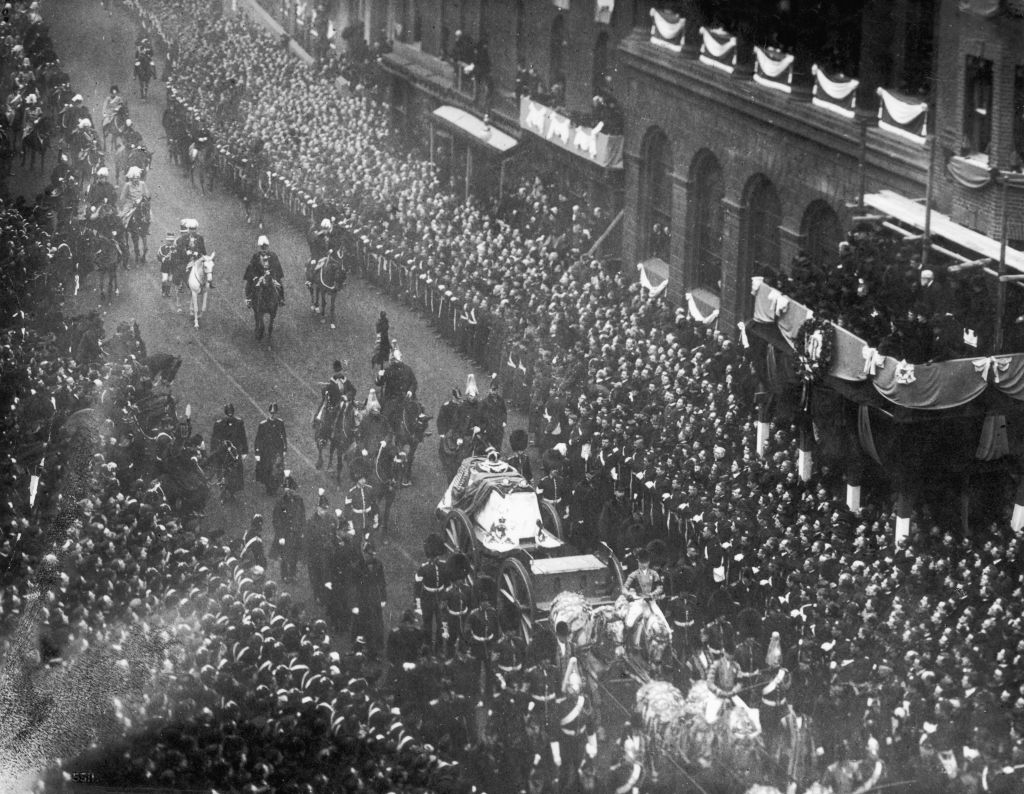2 February 1901: Queen Victoria’s funeral procession
Britain mourned the death of Queen Victoria by holding a grand state funeral for Britain's then longest-reigning monarch, on this day in 1901.


Get the latest financial news, insights and expert analysis from our award-winning MoneyWeek team, to help you understand what really matters when it comes to your finances.
You are now subscribed
Your newsletter sign-up was successful
Want to add more newsletters?
Britain was plunged into mourning following the death of Queen Victoria, at the age of 81, in January 1901. Her body lay in state for eight days in the dining room of Osborne House, her home on the Isle of Wight. Then the body of Britain's then longest-reigning monarch was escorted to the mainland by a fleet of warships.
It was the end of an era that had seen Britain cover the globe in great swathes of imperial red. Awe-inspiring advances in engineering and science had taken place during Victoria's 63-year reign that had also kept the peace between Britain and the young pretender, Germany.
It was no secret that the soon-to-be Edward VII didn't get on with his near-relative, and Victoria's grandson, German Kaiser Wilhelm II. So it was with good reason that the nation looked to the new century with some trepidation. Just 13 years later, the First World War exploded across Europe.
MoneyWeek
Subscribe to MoneyWeek today and get your first six magazine issues absolutely FREE

Sign up to Money Morning
Don't miss the latest investment and personal finances news, market analysis, plus money-saving tips with our free twice-daily newsletter
Don't miss the latest investment and personal finances news, market analysis, plus money-saving tips with our free twice-daily newsletter
The British had also forgotten how to mourn on so grand a scale. The last great state funeral procession had been for the Duke of Wellington back in 1852. But on a sleet-ridden 2 February 1901, Queen Victoria's coffin, draped in white satin, wound its way from London to Windsor on the back of a gun carriage, with all the pomp and ceremony due the passing of a great monarch.
The weather that day was miserable. And the fractious horses had to be unharnessed from the carriage and replaced with a team of sailors. Otherwise, the procession adhered to the Queen's own instructions, so that, in the words of The Times' correspondent, "those who had been her subjects might look upon the moving scene in common grief".
The procession arrived at St George's Chapel, and Victoria was laid to rest with her beloved late husband, Prince Albert, in Frogmore Mausoleum. So attached had they been in marriage that Albert is supposed to have once reassured her, "We don't know in what state we shall meet again; but that we shall recognise each other and be together in eternity I am perfectly certain."
Get the latest financial news, insights and expert analysis from our award-winning MoneyWeek team, to help you understand what really matters when it comes to your finances.

-
 What the government’s baby boomer retirement data says about the future of pensions
What the government’s baby boomer retirement data says about the future of pensionsA study of the retirement routes of people born in 1958 paints a worrying picture for people’s pension savings
-
 An experienced investor’s end of tax year checklist
An experienced investor’s end of tax year checklistThe clock is ticking down before the end of the 2025/26 tax year, when any tax-free savings and investment allowances are lost. For experienced investors, though, the deadline for some tax-saving schemes is even earlier.
-
 31 August 1957: the Federation of Malaya declares independence from the UK
31 August 1957: the Federation of Malaya declares independence from the UKFeatures On this day in 1957, after ten years of preparation, the Federation of Malaya became an independent nation.
-
 13 April 1960: the first satellite navigation system is launched
13 April 1960: the first satellite navigation system is launchedFeatures On this day in 1960, Nasa sent the Transit 1B satellite into orbit to provide positioning for the US Navy’s fleet of Polaris ballistic missile submarines.
-
 9 April 1838: National Gallery opens in Trafalgar Square
9 April 1838: National Gallery opens in Trafalgar SquareFeatures On this day in 1838, William Wilkins’ new National Gallery building in Trafalgar Square opened to the public.
-
3 March 1962: British Antarctic Territory is created
Features On this day in 1962, Britain formed the British Antarctic Territory administered from the Falkland Islands.
-
10 March 2000: the dotcom bubble peaks
Features Tech mania fanned by the dawning of the internet age inflated the dotcom bubble to maximum extent, on this day in 2000.
-
9 March 1776: Adam Smith publishes 'The Wealth of Nations'
Features On this day in 1776, Adam Smith, the “father of modern economics”, published his hugely influential book The Wealth of Nations.
-
 8 March 1817: the New York Stock Exchange is formed
8 March 1817: the New York Stock Exchange is formedFeatures On this day in 1817, a group of brokers moved out of a New York coffee house to form what would become the biggest stock exchange in the world.
-
7 March 1969: Queen Elizabeth II officially opens the Victoria Line
Features On this day in 1969, Queen Elizabeth II took only her second trip on the tube to officially open the underground’s newest line – the Victoria Line.